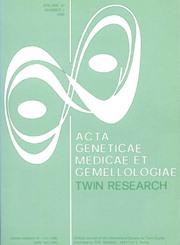Article contents
Cognitive Development and Behaviour in Very Low Birthweight Twins at Four Years
Published online by Cambridge University Press: 01 August 2014
Abstract
This study included two groups of 37 children, one of twins and the other singletons at 4 years of age. All subjects had birthweights under 1500 grams and individuals in the groups were matched for birth date, gender and birthweight. Except when parental socio-economic status was taken into account, no significant differences between twins and singletons were observed on any of the results of The Stanford-Binet Intelligence Scale, nor were there any when the twins and singletons were divided into groups with birthweights < 1000 grams and 1000 to 1499 grams. When cognitive scores were analysed in relation to socio-economic status, there were significant differences in the whole population between subjects in the high and low socioeconomic status groups, with higher mean scores for the former. Comparison of the twins and singletons with parents in the lower socio-economic status group did not produce any significant differences but in the case of the upper socio-economic status group the singletons scored significantly better that the twins in Quantitative Reasoning and on the Composite Score. No significant differences were demonstrated in the clinical assessment of speech, language or behaviour. So far as general life considerations and health were concerned only one significant difference was found and this was for the number of siblings born subsequently, with more born in the singleton families. This study did not provide support for the view that singletons and twins differ significantly in the areas considered.
Keywords
- Type
- Research Article
- Information
- Acta geneticae medicae et gemellologiae: twin research , Volume 45 , Issue 3 , July 1996 , pp. 325 - 332
- Copyright
- Copyright © The International Society for Twin Studies 1996
References
REFERENCES
- 5
- Cited by


